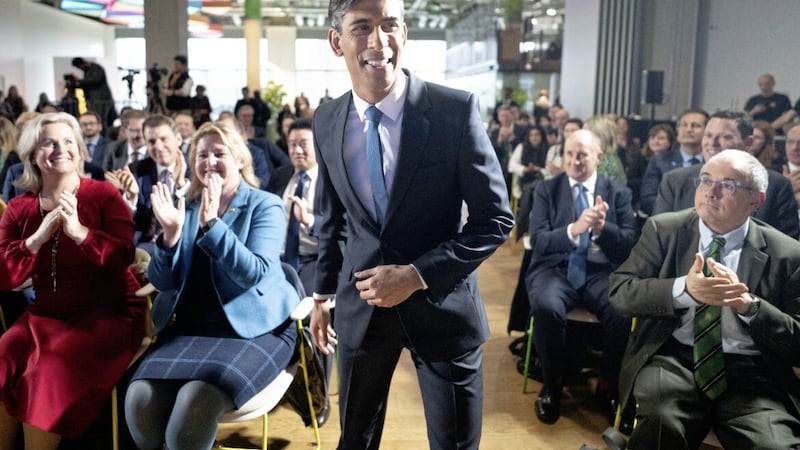ARE there, I wonder, any unionists who would say, with a straight face and hand firmly on their heart, that they’d trust a UK government – Conservative or Labour – to protect and promote their interests?
It’s a question which is asked, albeit quietly, by key people across unionism, loyalism and the Orange Order. It’s a question I hear regularly at meetings, panels and conferences, from unionists, nationalists and ‘others’.
And it’s a question I’ve heard far more often since the DUP cut its deal with the Conservatives in June 2017 and was then serially and comprehensively shafted by Theresa May, Boris Johnson, Liz Truss (with her buns-to-the-bear protocol bill) and now Rishi Sunak.
Over 30 years ago, when I was briefly a member of the Conservative Party in Northern Ireland, I had a lunchtime conversation with three MPs at the annual conference in Brighton.
It was around the time when John Major and Brian Mawhinney (the Belfast-born chairman of the party) were trying to stop the NI members from fielding candidates in the 1996 Forum election and some of us were wondering what the point was of the party if we weren’t fielding candidates at that crucial moment.
Anyway, I asked the MPs if we could trust the government to protect and promote pro-union interests in Northern Ireland: something along the lines of a willingness to make the case for the union rather than just continue in the role of some sort of neutral broker – the bi-partisan approach that had been adopted by both Labour and Conservatives as far back as October 1972.
Their answers were non-committal, with the usual stuff about Northern Ireland ‘not being the same as Great Britain’ and how matters had to be handled very delicately. In other words, they claimed to be unionist at heart (“We’re the Conservative and Unionist Party, don’t forget”), but clearly didn’t want to say so particularly loudly.
In 1922 Lord Carson claimed that unionists had just been used as puppets by the Conservative Party. In 2022, during the run-up to May’s Assembly election, I heard a variation of his comments by a number of leading unionists and loyalists.
This time, though, they were complaining about Boris Johnson’s ‘betrayal’ over the NI Protocol and the undermining of their constitutional status. The party, into whose basket they had placed all their eggs, had scrambled them and then tossed them back in their faces.
With, I think, just one exception, the entire Conservative parliamentary party voted in favour of the protocol. Voted to get Brexit done even if it meant angering all of unionism and treating NI entirely differently.
Or, putting all of that another way, they voted not to protect and promote the interests of unionism here. And do you know something, it didn’t surprise me in the slightest.
Johnson’s government and 99.9 per cent of the ERG put their own interests above all other interests: and they would have done exactly the same thing had it been Scotland or Wales. We are, after all, part of that ‘Celtic fringe’ which a regenerated English nationalism would happily dump if it thought we were blocking their definition of sovereignty, freedom and Englishness.
But it’s not just English nationalism that presents a problem for unionism at the moment. Rishi Sunak has a lot of fish to fry between now and the next general election – due by January 2025 at the latest – and the last thing he needs is a new impasse or run-in with the EU.
As I noted a couple of weeks ago, he really does want Brexit done, dusted and behind him. And if that means upsetting the DUP then so be it.
If that means taking up Keir Starmer’s offer of a parliamentary lifeline or ‘mechanism’ which would allow him to face down a backbench revolt then so be it. If that means the DUP pulling down the Assembly he’ll let them.
All of which means the DUP will be facing a massive headache in a matter of weeks.
It may have heaved a sigh of relief that the EU/UK joint statement on Monday was as interesting as a printed-out prediction from the Zoltar the Great machine on Brighton Pier, but Jeffrey Donaldson is long enough in the negotiating tooth to know that the less is said in a statement the more likely it is a deal is close.
He knows, too, that the deal will not deliver the entirety of what the TUV, LCC, new-generation loyalism and sections of the Orange Order want: and that, consequently, they’ll want him to collapse the Assembly permanently.?
I’ve written before about Donaldson’s pro-devolution instincts: instincts shared by most of his party, I believe, as well as by most of the UUP. Crucially, though, his instincts are not shared by many other unionists and loyalists; and that will be a crucial factor when decisions have to be made when the EU/UK deal sees the light of day.
So Sunak has to find a way of reassuring as many unionists as possible that the protocol and the EU/UK deal do not present an existential threat to the union.
The irony, of course, is that if he fails to reassure them it will be because they haven’t thrown off their life-long fear of Conservative treachery.
And if that is true, then what does it say about the role and place of ‘Ulster’ unionism within the United Kingdom?








